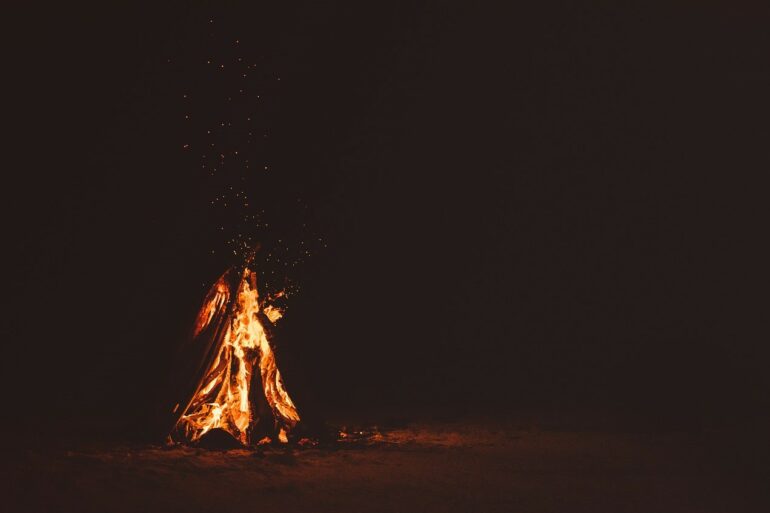A crackling campfire and four masterful storytellers – that is the sound of Worlds Beyond Number, a podcast in which the performers utilise Dungeons & Dragons to collaboratively weave a narrative that thrives on plot and character work in a fantastical world full of wizards, witches, and spirits.
By Marie Lorenzen
Imagine, just for a moment, that you’re somewhere else. Not in front of a laptop or your phone, but perhaps in the middle of a forest. It’s late, there’s a fire roaring in front of you and you’re surrounded by friends. They’re getting ready to tell a story. You feel warm and cosy, ready to immerse yourself in your friends’ woven narrative. Finally, one of them starts speaking. The story begins:
»Beautiful stars hang in the night-time sky, celebrating the near full moon that shines light over a vast and endless rippling sea of treetops, whose leaves are cast in indigo by the pale moonlight. Wind moves over them, feeling of brisk chill air, the coming of winter. And in all of this silver and violet, there is one cradled point of warm and orange light emanating from the crosshatched and little dust covered windows of a humble country tavern.«
If that left you with a sense of curiosity, or even made you just a little interested, then Worlds Beyond Number might be the right fit for you. It’s an actual play fiction podcast by four of the most interesting voices in the Dungeons & Dragons and actual play world at the moment. WBN joins expansive worldbuilding with intriguing plot beats and complex characters. Game Master Brennan Lee Mulligan and players Aabria Iyengar, Erika Ishii, and Lou Wilson go back to the roots of storytelling and masterfully achieve one of the most intriguing aspects of the genre: building your own narrative with your friends.
What is Actual Play?
Even though actual play content has gained immense popularity over the last few years, it’s still fairly niche. If this is the first time you’ve heard about it, you haven’t been living under a rock. Actual play is a genre of usually podcasts or web shows where a group of people plays TTRPGs. (Still confused? TTRPGs are tabletop roleplaying games such as Dungeons & Dragons, Pathfinder, or Call of Cthulhu, where players take on a role in a world narrated/presented by the Game Master [GM].) Notably, actual play is usually more focused on the narrative and characters than an at home game might be. WBN actually uses the term »narrative play« instead of »actual play«, shifting from depicting the entire gaming process, like in live shows such as Critical Role, to showing less of the game mechanics and more of the narrative itself.
Moreover, it is interesting to explore why an audio-only medium such as podcasts works especially well for actual or narrative play. TTRPGs use »theatre of the mind« to depict scenes and interactions. This means that, for the most part, there are no visual clues or representations to rely on, and everybody forms their own picture of the events. Theatre of the mind invites a shared space where both players and the audience experience the narrative only through words. Also, in the absence of visual beats, sound design in an actual play podcast is a unique opportunity to support and enhance the narrative.
Who traverses Worlds Beyond Number?
The first campaign of WBN, »The Wizard, the Witch, and the Wild One«, takes place in a magical fantasy setting, the world of Umora. Umora is »a magical world demarcated between the world of mortals and the world of [nature] spirits … [that] is suffused in every possible way with magic«. Mulligan presents a framework that is intriguing for listeners more familiar with the genre and at the same time presents a distinct introduction for those just starting out with fantasy and/or actual play. It’s a world that is sure to draw the audience in without revealing too many of its secrets at once, though the exposition and character interactions make it clear that there is much to be discovered. Mulligan cites Hayao Miyazaki’s films, Japanese folklore, and Celtic Mythology as their main inspirations for worldbuilding.
Erika Ishii takes on the role of Ame, a nature-loving witch who grew up in a quaint country cottage under the wing of the village witch. Her introduction paints her as kind, communal, and daring. Ame has to navigate a world that isn’t always gentle, but she does so with an »expansive heart« (Mulligan). In Umora, witches act as communicators between the material and the spirit world and so, in the story so far, Ame sometimes has to play mediator between Suvi and Eursulon.
Suvi, a wizard from the militaristic organisation called the Citadel, is portrayed by Aabria Iyengar. Iyengar navigates the intricacies of her character with such mastery that you cannot help but wish for a detailed biography of Suvi’s past, present, and future. She perfectly encapsulates the arrogance of a young wizard who thinks she can rule the world with a swish of her wand but who actually grew up quite sheltered and has much to learn.
Last but not least, Lou Wilson portrays the spirit Eursulon who left his own world as a child. As a spirit, Eursulon is perhaps the least grounded of the characters (at least in the beginning) since we see (or rather, hear) him struggle with a world that is not his own. With his true self hidden, Eursulon must gain people’s trust and reconcile his existence in the material world with his identity – something he must be careful to stay tethered to.
As for the actual story, we join Ame and Suvi as they are confronted with the death of Grandmother Ren, Ame’s mentor and the person all three of the characters spent a summer with together as children. At the same time, the witch and the wizard discover a curse that has been placed on Ame. They must find and rejoin their old friend Eursulon, whose sword is able to break curses. On their journey, they discover parts of the world filled with injustice, wondrous and dangerous magics, and precarious conflicts.
Why is this world worth a visit?
Worlds Beyond Number
Creators: Brennan Lee Mulligan, Erika Ishii, Aabria Iyengar, and Lou Wilson
Producer: Taylor Moore
Overall, the performers are able to bring a sense of urgency to their actions and choices (which, again, are only conveyed to the audience in words), which adds significantly to the sense of immersion. Mulligan, as the GM, provides us with a world that is inviting, atmospheric, and remarkably responsive to the characters – the line between improvisation and pre-prepared story is practically invisible. His exceptional world-building is solid and airtight, allowing for the audience to immerse themselves in the world and enjoy discovering it just as much as the players do.
In WBN, the interplay of four immensely talented improvisers and storytellers is truly a joy to behold. In every interaction you can feel how much the group is in tune with each other and clearly has just as much, if not more fun playing as the audience has listening. The clear emphasis on narrative and character work makes this podcast a real gem of the actual play world. So, settle in around the campfire and enjoy the sound of Worlds Beyond Number.
All quotes by Brennan Lee Mulligan are taken from this interview.






